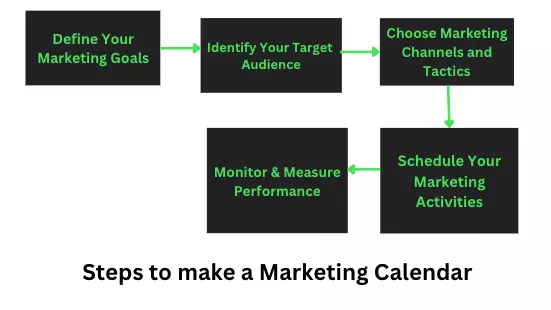Marketing Calendar
Definition
A marketing calendar is a schedule of planned marketing activities, such as campaigns, promotions, and events, organised by date and time.
Description
A marketing calendar is tool marketing teams use to plan and organise their marketing activities over a specified period, such as a month, quarter, or year. It includes a schedule of planned campaigns, promotions, events, and other marketing activities, organised by date and time.

A marketing calendar helps to ensure that marketing activities are strategically planned, executed, and measured and can also help to coordinate efforts across multiple teams and channels. By using a marketing calendar, marketing teams can optimise their efforts and ensure they are aligned with business goals and objectives.
Importance of Marketing Calendar
A marketing calendar is an essential tool for any marketing team because it helps to ensure that marketing efforts are well-planned, executed, and measured. Here are some key reasons why a marketing calendar is essential:
- Strategic planning: A marketing calendar allows marketing teams to plan their activities in advance and align them with overall business goals and objectives. This helps ensure that marketing efforts focus on the right target audience and support the company’s overall mission and vision.
- Coordination: A marketing calendar helps to coordinate marketing efforts across multiple teams and channels. By scheduling marketing activities in advance, teams can ensure that they are not overlapping or competing with each other and can work together more effectively.
- Resource allocation: A marketing calendar helps to allocate resources, such as budget and personnel, more effectively. By knowing in advance what marketing activities are planned, teams can allocate resources accordingly and avoid overspending or understaffing.
- Measurement: A marketing calendar allows teams to measure the effectiveness of their marketing efforts by tracking and analysing the performance of each activity. This helps to identify what is working well and what needs to be improved and can inform future marketing decisions.
How to make a marketing calendar?
Here are some steps for making a marketing calendar:

- Define your marketing goals and objectives: Before creating a marketing calendar, it’s important to clearly understand your goals and objectives. These should align with your overall business goals and be specific, measurable, achievable, relevant, and time-bound.
- Identify your target audience: Determine who your target audience is and what channels they use to consume content and engage with brands. This will help you choose the best marketing channels and tactics to reach and engage with them.
- Choose your marketing channels and tactics: Based on your target audience and marketing goals, choose the marketing channels and tactics that are most effective for reaching and engaging with your audience. This could include social media, email marketing, content marketing, advertising, and events.
- Schedule your marketing activities: Using a calendar tool such as Google Calendar or Trello, schedule your marketing activities over a specified period, such as a month, quarter, or year. Include important dates, such as holidays and industry events, and assign responsibilities for each activity.
- Monitor and measure your performance: Regularly monitor and measure the performance of your marketing activities using metrics such as website traffic, engagement rates, conversion rates, and sales. Use this data to adjust your marketing calendar and optimise your marketing efforts.
Future Strategies for Marketing Calendar
Here are some future strategies for making a marketing calendar:
- Use AI and machine learning: As AI and machine learning technologies become more advanced, they can be used to analyse data and predict consumer behaviour more accurately. By incorporating these technologies into your marketing calendar, you can optimise your marketing efforts and personalise your marketing messages to each customer.
- Focus on customer experience: In the future, marketing calendars will increasingly focus on creating personalised and seamless customer experiences across multiple touchpoints. This will require a deeper understanding of the customer journey and a more integrated marketing, sales, and customer service approach.
- Incorporate social responsibility: Consumers are increasingly interested in supporting brands that have a social conscience and are committed to positively impacting society. In the future, marketing calendars must incorporate social responsibility into their messaging and activities and showcase how the brand is making a difference.
- Embrace emerging technologies: As new technologies emerge, such as virtual and augmented reality, voice assistants, and intelligent devices, marketing calendars must adapt and incorporate them into their strategies. This will require a more creative and innovative marketing approach and a willingness to experiment with new technologies.
Example
Nike, a popular sports apparel and footwear brand, illustrates how a marketing calendar can be used.
Nike’s marketing calendar could include the following:
- January: Launch of new running shoe line, social media campaign featuring famous athletes promoting the new line.
- February: Valentine’s Day campaign featuring limited edition sneakers and athletic wear.
- March: Launch of a new line of workout gear, International Women’s Day campaign featuring female athletes and influencers.
- April: Earth Day campaign featuring sustainable and eco-friendly products.
- May: Launch of the summer collection, Memorial Day promotion offering discounts on summer apparel and shoes.
- June: World Cup soccer campaign featuring national team jerseys and soccer shoes.
- July: Fourth of July promotion offering discounts on patriotic-themed apparel and shoes.
- August: Back-to-school campaign featuring new styles and colours for school uniforms and sports gear.
- September: Launch of the fall collection, Labor Day promotion offering discounts on fall apparel and shoes.
- October: Breast Cancer Awareness Month campaign featuring pink ribbon merchandise and donations to breast cancer research.
- November: Black Friday and Cyber Monday promotions offering discounts on all products.
- December: Holiday campaign featuring gift guides and discounts on holiday-themed products.
FAQ
What is a marketing calendar?
A marketing calendar is a tool businesses use to plan and schedule marketing activities throughout the year. It helps businesses to coordinate and track various marketing activities, such as product launches, promotions, events, and content creation.
Why is a marketing calendar important?
A marketing calendar helps businesses to stay organised, plan ahead, and ensure that their marketing efforts are aligned with their overall business goals. It also allows businesses to coordinate their marketing efforts across different channels and touchpoints and measure their marketing activities’ effectiveness.
What should be included in a marketing calendar?
A marketing calendar should include important dates and events, such as holidays, industry events, product launches, and promotions. It should also include details about the specific marketing activities planned for each date, such as social media posts, email campaigns, content creation, and advertising.
How do you create a marketing calendar?
Identify important dates and events relevant to your business to create a marketing calendar. Then, determine the specific marketing activities you want to plan and schedule for each date. Use a spreadsheet or calendar tool to visually represent your marketing plan for the year.
How often should a marketing calendar be updated?
A marketing calendar should be updated regularly, at least once a month, to reflect any changes in the business environment or marketing strategy. It should also be reviewed and adjusted to ensure marketing efforts are well-coordinated and aligned with business goals.
How can I measure the effectiveness of my marketing calendar?
To measure the effectiveness of your marketing calendar, track key performance indicators (KPIs) such as website traffic, social media engagement, email open and click-through rates, and sales. Compare these metrics to your marketing goals and objectives to determine the success of your marketing activities.





We would love to have your opinion.